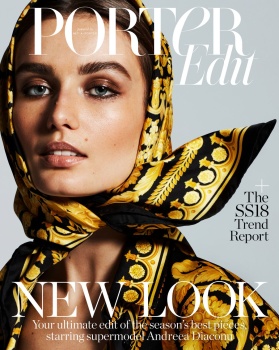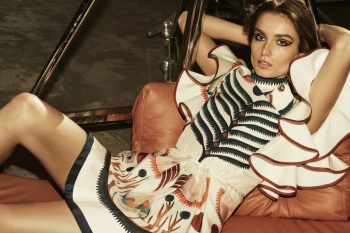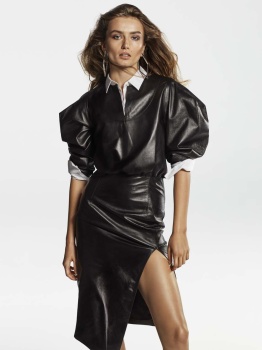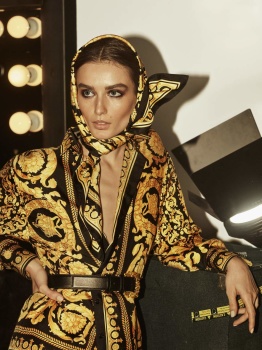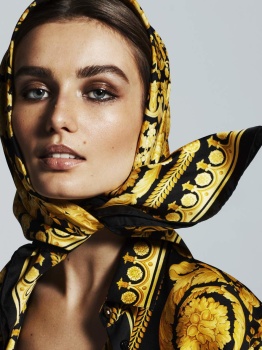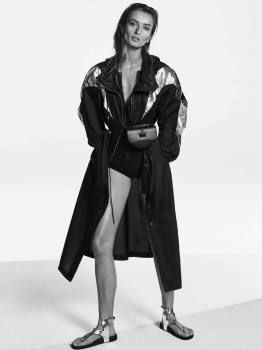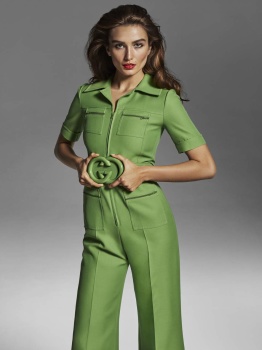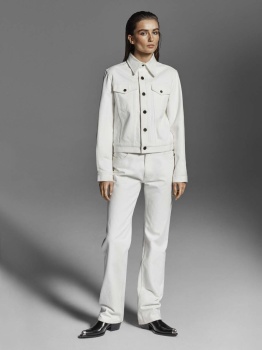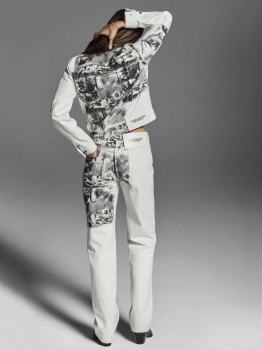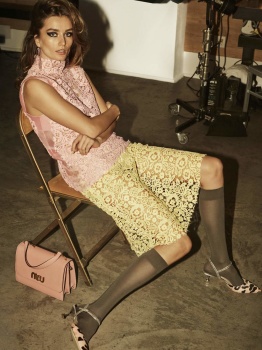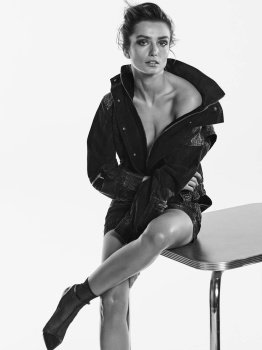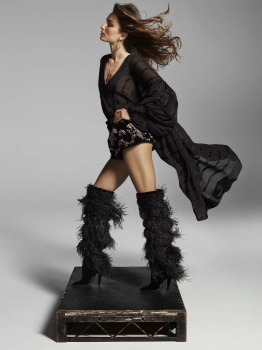Wearing the standout looks of SS18, supermodel ANDREEA DIACONU explains why she’s anti social media and how she learned to say no to bullying photographers. By JANE MULKERRINS
Andreea Diaconu is explaining to me, with absolute sincerity, why she can’t wear bras. “I get sick from them. Seriously, they give me acid reflux,” she insists. “I think it’s because I don’t really have boobs.” She grabs at her chest to emphasize the point. “But it means I can’t do lingerie shoots.” For many models, that might present a problem. Diaconu, however, could not seem less troubled by this impediment. Admittedly, it isn’t as if she’s short of work: one of the most in-demand models of the moment, the 26-year-old Romanian has walked the runway for everyone from Dolce & Gabbana, Gucci and Lanvin to Tom Ford, Stella McCartney and John Galliano. She is currently the face of Viktor & Rolf, and recently landed a lucrative contract with Michael Kors. Moreover, you get the distinct impression that, while she is grateful for her success, she’d much rather be on a surfboard, a bike or under canvas in the wilderness than on a catwalk. “I don’t know what I’m doing in the fashion industry,” she admits with a chuckle.
She doesn’t even seem troubled to be skipping this year’s London, Paris and Milan fashion weeks; while she awaits the arrival of her US Green Card, she can’t leave the country. “But I can travel around the US,” she points out, impressively sanguine. “I can go to Hawaii, Idaho, Alaska… Alaska is one of my favorite states. I can go camping in Maine and Wyoming. So, I might just take a vacation.”
We’re in a cavernous studio in Greenpoint, Brooklyn, and Diaconu is curled up on a leather sofa beside me, her foal-like legs folded underneath her. She describes her off-duty style as that of “an eight-year old boy”, albeit a seriously cool eight-year-old boy who owns a Prada sweater with spaceships on it. There is certainly a tomboy vibe to Diaconu, who boasts a black belt in karate, as well as speaking five languages. This is a woman who will try pretty much anything, it seems. “I’m looking at winter wetsuits because I want to go surfing this weekend,” she says now, despite the below-zero temperature outside. So dedicated is she to her hobby that, for a couple of years, as well as her apartment in New York’s West Village, she also rented a place out at Rockaway beach; the long, thin strip of oceanfront beyond JFK Airport where Atlantic rollers crash in. Handily, her boyfriend of several months, restaurateur Evan Bennett, shares her passion. “He’s been my best friend for a while but I never knew he surfed, then we went surfing and he, like, rips,” she gushes, blushing ever so slightly. “I was like, ‘Oh. Excuse me. Don’t mind if I do.’”
Diaconu grew up in Bucharest, Romania’s capital, just after the fall of Communism, though the effects of a new capitalist economy were slow to become tangible. Her parents split up when she was small, so she shared an apartment on the city’s outskirts with her mother, uncle and grandmother. “A lovely Communist building, with fabulous linoleum floors,” Diaconu says wryly. Her mother, Aurora, sounds gloriously bohemian. “She’s vegan, and raw, and really into New Age stuff, and ‘reading people’s frequencies’,” reports her only child, with an exaggerated eye-roll. “She was an IT programmer for most of her life, then she quit that to start a company that sells, like, mushrooms from Malaysia that claim to cure cancer.”
While the family had “no spare money”, they made the most of state-sponsored opportunities. “My grandmother had these pension tickets, which the government would give you along with 18 days leave, so we would go to the seaside or hot springs or mud baths,” Diaconu recalls. “It would just be me and my grandma in a single bed, and usually another older lady sharing the room with us. Those vacations were so much fun, but nobody ever got to travel outside [Romania]. I never thought that I would leave my country.”
By the age of 11, Diaconu was already 5ft 7in tall (she’s 5ft 10.5in now) and, unsurprisingly, began to catch the eye of modeling scouts. She had no interest. “I didn’t understand the concept of scouting,” she laughs. “I just didn’t understand why somebody would seek me out to do something, instead of me seeking them out. I was a total Skeptical Sally.” Eventually, at age 13, she relented, but strictly for the cash. “I needed money for a karate competition I wanted to enter. So I agreed to do a random job and they paid me 50 euros.” By 14, she was being booked for shoots in London, New York, Paris and Tokyo, and traveling alone. But she struggled with the harsh attitudes and treatment she experienced. “I remember being in New York, and a tailor yelling at me that I was too skinny, that she couldn’t tailor the skirt to my body. I thought: f**k this, I’m going home.”
Her experiences are, sadly, not unique. The fashion world is one of many industries facing up to the reality and legacy of years of unacceptable conduct. “There have definitely been situations with photographers where I’ve been uncomfortable,” says Diaconu. “Where photographers are like, ‘Oh, just take your top off, it’s going to make it a better picture.’ You think: What? We’re taking a portrait and you want me to take my underwear off? No. And then you get bullied into it.” She capitulated once, for a prestigious magazine – her topless image made the cover. “I hid my head inside my pillow for 20 months afterwards,” she says, putting her face in her hands, embarrassed even now. “I don’t want to do it again. That’s definitely something that people need to respect: no just means no.”
She also recalls an encounter, when she was 14, alone in a car in Japan with a man she didn’t know. Driving her to castings, he began describing his penis to her. “In that environment, you don’t speak the language, nobody speaks your language, there’s only this one person that drives you around, and then that person turns out to be a creep,” she says. “I think I’m quite resilient, but there definitely needs to be regulations to help girls who maybe don’t have the confidence that I had.”
Diaconu did, for a time, quit the modeling industry completely. At 17, she set up a restaurant with friends in Bucharest – Moo Moo, which serves healthy, slow-cooked food – and enrolled in college. But she dropped out after a year and, at 20, moved to New York, where she took up her career again. “I thought, I’ll just take a gap year and see what happens…” she shrugs. “And then that turned into six gap years.”
Her social following is relatively small when compared to the likes of Cara Delevingne, Joan Smalls, Karlie Kloss and Edie Campbell, despite US Vogue putting her in their realm, naming her as one of the #InstaGirls. “I don’t know how that happened. I have, like, four followers,” Diaconu says with a laugh. (It’s actually 148,000.) “Those girls all have millions.” She shrugs. “You have to post things for work, contractually, but I don’t like the rush you get from it, I don’t like the instant gratification of getting a bunch of likes – I don’t think it’s good for us. And I want to spend less time on my phone.” So she has no desire, then, to become ‘a brand’? “Karlie and Cara are superstars and they want to be superstars – they like being famous,” she says. “I have a bad personality for that; I don’t like attention that much.”
She has, however, seen the power of posting about important issues close to her heart, such as the Open Door Foundation, an organization she works with to fight human trafficking in Romania. “If something just dissolves you because it’s so upsetting, then you should post about it and talk about it, and maybe it’ll reach somebody else who has different contacts, and maybe it will create some sort of trickle-down effect, and help in some way or another.”
Still, she really has no idea of her own potential for influence. “My agent’s always like: ‘You’re Andreea Diaconu.’ And I’m like, ‘Yeah, exactly. I don’t think we’re talking about the same Andreea Diaconu.’”


